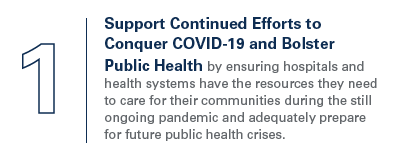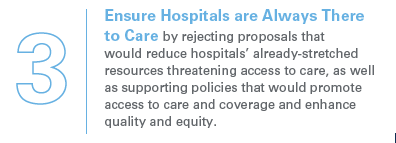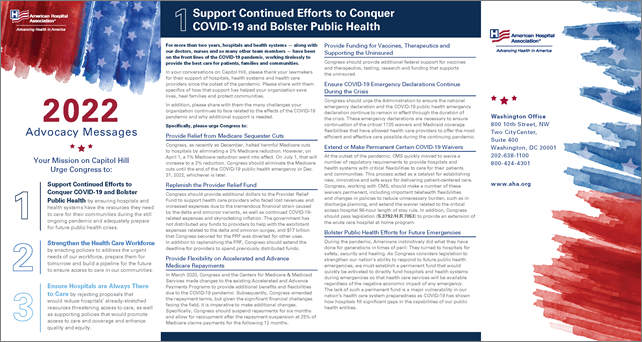2022 Advocacy Messages
2022
Advocacy Messages

Your Mission on Capitol Hill
Urge Congress to:
1. Support Continued Efforts to Conquer COVID-19 and Bolster Public Health
For more than two years, hospitals and health systems — along with our doctors, nurses and so many other team members — have been on the front lines of the COVID-19 pandemic, working tirelessly to provide the best care for patients, families and communities.
In your conversations on Capitol Hill, please thank your lawmakers for their support of hospitals, health systems and health care providers since the outset of the pandemic. Please share with them specifics of how that support has helped your organization save lives, heal families and protect communities.
In addition, please share with them the many challenges your organization continues to face related to the effects of the COVID-19 pandemic and why additional support is needed.
Specifically, please urge Congress to:
Provide Relief from Medicare Sequester Cut
Congress, as recently as December, halted harmful Medicare cuts to hospitals by eliminating a 2% Medicare reduction. However, on April 1, a 1% Medicare reduction went into effect. On July 1, that will increase to a 2% reduction. Congress should eliminate the Medicare cuts until the end of the COVID-19 public health emergency or Dec. 31, 2022, whichever is later.
Replenish the Provider Relief Fund
Congress should provide additional dollars to the Provider Relief Fund to support health care providers who faced lost revenues and increased expenses due to the tremendous financial strain caused by the delta and omicron variants, as well as continued COVID-19- related expenses and skyrocketing inflation. The government has not distributed any funds to providers to help with the exorbitant expenses related to the delta and omicron surges, and $17 billion that Congress secured for the PRF was diverted for other uses. In addition to replenishing the PRF, Congress should extend the deadline for providers to spend previously distributed funds.
Provide Flexibility on Accelerated and Advance Medicare Repayments
In March 2020, Congress and the Centers for Medicare & Medicaid Services made changes to the existing Accelerated and Advance Payments Programs to provide additional benefits and flexibilities due to the COVID-19 pandemic. Subsequently, Congress amended the repayment terms, but given the significant financial challenges facing the field, it is imperative to make additional changes. Specifically, Congress should suspend repayments for six months and allow for recoupment after the repayment suspension at 25% of Medicare claims payments for the following 12 months.
Provide Funding for Vaccines, Therapeutics and Supporting the Uninsured
Congress should provide additional federal support for vaccines and therapeutics, testing, research and funding that supports the uninsured.
Ensure COVID-19 Emergency Declarations Continue During the Crisis
Congress should urge the Administration to ensure the national emergency declaration and the COVID-19 public health emergency declaration continue to remain in effect through the duration of the crisis. These emergency declarations are necessary to ensure continuation of the critical 1135 waivers and Medicaid coverage flexibilities that have allowed health care providers to offer the most efficient and effective care possible during the continuing pandemic.
Extend or Make Permanent Certain COVID-19 Waivers
At the outset of the pandemic, CMS quickly moved to waive a number of regulatory requirements to provide hospitals and health systems with critical flexibilities to care for their patients and communities. This process acted as a catalyst for establishing new, innovative and safe ways for delivering patient-centered care. Congress, working with CMS, should make a number of these waivers permanent, including important telehealth flexibilities and changes in policies to reduce unnecessary burden, such as in discharge planning, and extend the waiver related to the critical access hospital 96-hour length of stay rule. In addition, Congress should pass legislation (S.3792/H.R.7053) to provide an extension of the acute care hospital at home program.
Bolster Public Health Efforts for Future Emergencies
During the pandemic, Americans instinctively did what they have done for generations in times of peril: They turned to hospitals for safety, security and healing. As Congress considers legislation to strengthen our nation’s ability to respond to future public health emergencies, we must establish a permanent fund that would quickly be activated to directly fund hospitals and health systems during emergencies so that health care services will be available regardless of the negative economic impact of any emergency. The lack of such a permanent fund is a major vulnerability in our nation’s health care system preparedness as COVID-19 has shown how hospitals fill significant gaps in the capabilities of our public health entities.
2. Strengthen the Health Care Workforce
The relentless battle to fight COVID-19 has strained our health care workforce like never before.
The incredible physical and emotional toll that hospital and health care workers have endured in caring for patients during the pandemic has, among other issues, exacerbated the shortage of hospital workers. Our nation simply does not have enough clinicians to care for patients today and not enough are in the training pipeline for the future.
Because our workforce is our most precious resource, hospitals and health systems are committed to supporting them. Hospitals have created programs and developed resources to promote caregiver well-being and resiliency.
However, the health care workforce crisis is a national emergency that needs immediate attention.
Specifically, please urge Congress to:
Lift the Cap on Medicare-funded Physician Residencies
Congress should pass legislation (S.834/H.R.2256) that would add 14,000 Medicare-funded residency slots, which would expand training opportunities in rural settings and help address health professional shortages.
Fund Medical School Scholarships to Improve Diversity in the Physician Workforce
Congress should enact the Pathway to Practice Training Program, which would increase the number of Medicare-funded residency slots; increase physician diversity by providing scholarships to 1,000 underrepresented students a year; improve access in underserved and under-resourced communities; and promote cultural and structural competency training to help improve the overall quality of care.
Boost Support for Nursing Schools and Faculty
American nursing schools turned away over 80,000 qualified applicants from baccalaureate and graduate programs in nursing in 2019 alone due to an insufficient number of qualified faculty, clinical sites, classroom space and budget constraints. Congress should pass legislation (S.246/H.R.851) that would provide resources to boost student and faculty populations, as well as support educational programming, partnerships and research at nursing schools.
3. Ensure Hospitals are Always There to Care
Hospitals and health systems are the cornerstones of their communities, and patients depend on them for access to care 24 hours a day, seven days a week. Congress must help to ensure hospitals have adequate resources to care for their communities.
Specifically, please urge Congress to:
Ensure Access to Care in Rural Communities
Congress should pass a number of policies to support rural hospitals, including making permanent the Medicare-dependent Hospital program and low-volume adjustment; removing permanently the 96-hour physician certification requirement for critical access hospitals; repealing new payment caps on provider-based rural health clinics; and extending ambulance add-on payments.
Support Policies to Advance Health Equity
Advancing health equity requires a multi-faceted approach focusing on data collection, research, training and improving clinical outcomes. Congress should support initiatives to improve the collection of race, ethnicity and language data; increase funding for federal agencies that conduct and fund equity research; and address the social and structural factors that influence health.
Protect the 340B Drug Pricing Program
For nearly 30 years, the 340B program has been critical to expanding access to life-saving prescription drugs and comprehensive health care services. Since July 2020, several drug manufacturers have engaged in unlawful actions to limit the scope of the program by denying 340B pricing through contract pharmacies. As legal challenges persist, Congress must continue its bipartisan support for the program.
Remove Barriers to Behavioral Health Care
Congress should remove barriers for individuals to access behavioral health by increasing oversight authority and enforcement power of CMS to hold health insurance plans accountable for providing reasonable coverage for services. In addition, Congress should eliminate Medicare’s 190-day lifetime limit on inpatient psychiatric care in freestanding psychiatric facilities (S.3061/H.R.5674) and the Institutions for Mental Disease Exclusion under Medicaid.
Bolster Efforts to Improve Maternal Health
Congress should bolster hospitals’ efforts to improve maternal health by making permanent and requiring states to extend Medicaid and CHIP eligibility to pregnant individuals for 12 months postpartum. The AHA also supports provisions of legislation (S.346/H.R.959) that seeks to end preventable maternal mortality and severe maternal morbidity in the U.S. and reduce disparities in maternal health outcomes.
Increase Access to Affordable Health Care Coverage
While we have made substantial gains in coverage over the past decade, significant gaps remain and the wind down of the COVID-19 PHE puts coverage for millions at risk. Congress should prioritize maintaining health benefits for individuals and families and increase coverage options for those who are uninsured, including by making permanent expanded Marketplace subsidies, continuing to provide support for states to expand Medicaid, and assisting states with managing the eligibility redetermination process at the end of the PHE.
Reset the IMPACT Act
Congress should pass legislation (H.R.2455) to reset the Improving Medicare Post-Acute Care Transformation Act of 2014 to make it relevant to the current post-acute care landscape, align with recent transformations of the existing post-acute care payment systems and account for the pandemic.
Address Prior Authorization and Payment Denials
Congress should pass legislation (S.3018/H.R.3173) to streamline and improve Medicare Advantage prior authorization processes, which would help providers spend more time on patients instead of paperwork.
Strengthen Cybersecurity Efforts
Congress should pass legislation (S.3904) to improve collaboration and coordination between federal agencies to prevent and respond to cyberattacks, as well as authorize cybersecurity training and an analysis of cybersecurity risks for the health care and public health sectors.





